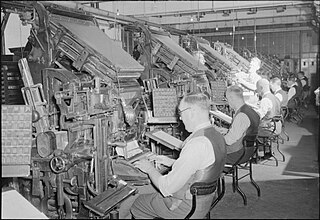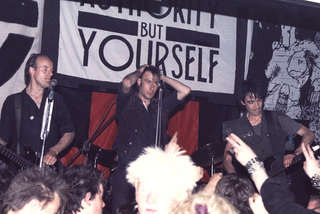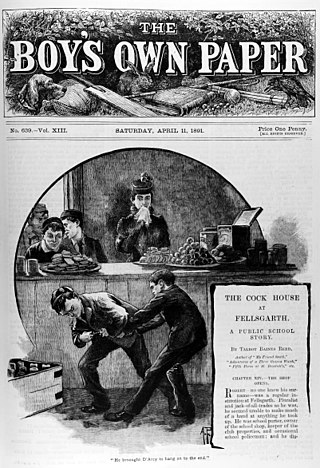
The history of British newspapers dates to the 17th century with the emergence of regular publications covering news and gossip. The relaxation of government censorship in the late 17th century led to a rise in publications, which in turn led to an increase in regulation throughout the 18th century. The Times began publication in 1785 and became the leading newspaper of the early 19th century, before the lifting of taxes on newspapers and technological innovations led to a boom in newspaper publishing in the late 19th century. Mass education and increasing affluence led to new papers such as the Daily Mail emerging at the end of the 19th century, aimed at lower middle-class readers.

Steve Ignorant is a singer and artist.
An evil empire is a speculative fiction trope.

James John Herbert, OBE was an English horror writer. A full-time writer, he also designed his own book covers and publicity. His books have sold 54 million copies worldwide, and have been translated into 34 languages, including Chinese and Russian.

Paul Bede Johnson was an English journalist, popular historian, speechwriter and author. Although associated with the political left in his early career, he became a popular conservative historian.

Penny dreadfuls were cheap popular serial literature produced during the 19th century in the United Kingdom. The pejorative term is roughly interchangeable with penny horrible, penny awful, and penny blood. The term typically referred to a story published in weekly parts of 8 to 16 pages, each costing one penny. The subject matter of these stories was typically sensational, focusing on the exploits of detectives, criminals, or supernatural entities. First published in the 1830s, penny dreadfuls featured characters such as Sweeney Todd, Dick Turpin, Varney the Vampire, and Spring-heeled Jack.
Christopher Hovelle Wood was an English screenwriter and novelist, best known for the Confessions series of novels and films which he wrote as Timothy Lea. Under his own name, he adapted two James Bond novels for the screen: The Spy Who Loved Me and Moonraker (1979).

John Peter Berger was an English art critic, novelist, painter and poet. His novel G. won the 1972 Booker Prize, and his essay on art criticism Ways of Seeing, written as an accompaniment to the BBC series of the same name, was influential. He lived in France for over fifty years.
Jean Hazel Henderson was a British American futurist and environmental activist. As an autodidact in her twenties, having only a British high-school formal education, in the U.S. she gradually advanced, by virtue of groundbreaking citizen activism, into the roles of university lecturer and chair-holder, as well as that of advisor to corporations and government agencies. She authored several books including Building a Win-Win World, Beyond Globalization, Planetary Citizenship, and Ethical Markets: Growing the Green Economy.
A story paper is a periodical publication similar to a literary magazine, but featuring illustrations and text stories, and aimed towards children and teenagers. Also known in Britain as "boys' weeklies", story papers were phenomenally popular before the outbreak of the Second World War.

Crass were an English art collective and punk rock band formed in Epping, Essex in 1977, who promoted anarchism as a political ideology, a way of life, and a resistance movement. Crass popularised the anarcho-punk movement of the punk subculture, advocating direct action, animal rights, feminism, anti-fascism, and environmentalism. The band used and advocated a DIY ethic approach to its albums, sound collages, leaflets, and films.
Diana Athill was a British literary editor, novelist and memoirist who worked with some of the greatest writers of the 20th century at the London-based publishing company Andre Deutsch Ltd.
Ernest Sackville Turner was an English freelance journalist and writer who wrote 20 published books, including Boys Will Be Boys, The Phoney War on the Home Front, and What The Butler Saw, and contributing to the Times Literary Supplement, London Review of Books, and regularly to the English satirical weekly magazine Punch.

Magazines intended for boys fall into one of three classifications. These are comics which tell the story by means of strip cartoons; story papers which have several short stories; and pulp magazines which have a single, but complete, novella in them. The latter were not for the younger child and were often detective or western in content and were generally greater in cost. Several titles were published monthly whereas the other two categories were more frequent.

Stephen H. Segal is a Hugo Award-winning American editor, author, journalist and publication designer.
Anti-British sentiment is prejudice, persecution, discrimination, fear or hatred against the British Government, British people, or the culture of the United Kingdom.

Laurie Penny is a British journalist and writer. Penny has written articles for publications including The Guardian,The New York Times and Salon. Penny is a contributing editor at the New Statesman and the author of several books on feminism, and they have also written for American television shows including The Haunting of Bly Manor and The Nevers.
Leo McKinstry is a British journalist, historian and author.

James Henderson was a British newspaper and magazine proprietor and publisher, who was influential in developing the popular press and comics in Britain. He established James Henderson & Sons Ltd, which published many newspapers and magazines as well as books and postcards.
Steven Grasse is an American advertising executive, author, distillery owner and the founder of Quaker City Mercantile. Throughout his career, Grasse has cultivated an avant-garde image, and he was called the "punk rock prince of small-batch spirits" by Alex Halberstadt.











